Jannis Kounellis
03 Mar - 17 Apr 2014
JANNIS KOUNELLIS
13 March - 17 April 2014
“I’m an old humanist, and for me man is an irreplaceable centrality and an open border.”
Jannis Kounellis
Born in Greece, but living in Italy since 1956, Kounellis has been a major figure in contemporary art for over fifty years. The artist is often referred to as one of the forefathers of the Arte Povera movement – a movement that arose in the 1960s and played a central role in redefining artistic practice with radical and highly original sculpture, performance and installation. Influenced by artists such as Alberto Burri, Lucio Fontana, Jackson Pollock and Franz Kline, and both within the context of Arte Povera and outside of it, Kounellis has throughout his career interrogated and extended the boundaries of contemporary art, and in particular the possibilities of painting.
Although most of his works are three-dimensional and comprised of ready-made objects (sometimes even living objects – horses, birds and humans), Kounellis has always insisted he is a painter first and foremost. While still a student, Kounellis had his first solo show, titled L’alfabeto di Kounellis, at the Galleria la Tartaruga, Rome. The artist exhibited black-and-white canvases, which had stenciled numbers and letters on their surface, but otherwise demonstrated little painterliness. During 1960 Kounellis began to introduce found sculptural objects such as actual street signs into his work, and that same year he wore one of his paintings and created a performance in his studio to demonstrate himself literally becoming one with his painting. The work, like much that followed, addressed both the realities and frustrations of contemporary society, while simultaneously considering primitive, fundamental, human values. From the late 1960s onwards, found objects – sometimes physically and culturally antithetical to one another - such as earth and fire, burlap sacks and gold, were used in his work. Kounellis also started to use live animals – famously, in 1969, tethering horses to the exhibition space at Galleria l’Attico - thereby transforming the gallery into a stage where real life, exhibition and art could converge. People, too, began to enter his installations, adding a performative element to his practice. In the twenty-first century, Kounellis has continued to mine the world for new material possibilities, in each instance adding to a rich history of meaning within his practice. Kounellis has been honored with major exhibitions at Stedelijk Museum, Amsterdam (1990); Museum Ludwig, Köln (1997); Neue Nationalgalerie, Berlin (2007); National Centre for Contemporary Art, Moscow (2011); and Today Art Museum, Beijing (201)1. His work has been included in iconic group exhibitions such as ‘Op losse schroeven’, Stedelijk Museum, Amsterdam (1969); ‘When attitudes become form’, Kunsthalle, Bern (1969); and Documenta 5, Kassel (1972). Kounellis has participated in six Venice Bienniales (1976, 1978, 1980, 1984, 1988 and 1993). His work is held in major institutional collections, including the Guggenheim, MOMA and Tate Modern. In recent years the artist has investigated architectural vocabulary, and his works appear increasingly sensitive to cultural, historical and site specificity.
Anna Dickie
13 March - 17 April 2014
“I’m an old humanist, and for me man is an irreplaceable centrality and an open border.”
Jannis Kounellis
Born in Greece, but living in Italy since 1956, Kounellis has been a major figure in contemporary art for over fifty years. The artist is often referred to as one of the forefathers of the Arte Povera movement – a movement that arose in the 1960s and played a central role in redefining artistic practice with radical and highly original sculpture, performance and installation. Influenced by artists such as Alberto Burri, Lucio Fontana, Jackson Pollock and Franz Kline, and both within the context of Arte Povera and outside of it, Kounellis has throughout his career interrogated and extended the boundaries of contemporary art, and in particular the possibilities of painting.
Although most of his works are three-dimensional and comprised of ready-made objects (sometimes even living objects – horses, birds and humans), Kounellis has always insisted he is a painter first and foremost. While still a student, Kounellis had his first solo show, titled L’alfabeto di Kounellis, at the Galleria la Tartaruga, Rome. The artist exhibited black-and-white canvases, which had stenciled numbers and letters on their surface, but otherwise demonstrated little painterliness. During 1960 Kounellis began to introduce found sculptural objects such as actual street signs into his work, and that same year he wore one of his paintings and created a performance in his studio to demonstrate himself literally becoming one with his painting. The work, like much that followed, addressed both the realities and frustrations of contemporary society, while simultaneously considering primitive, fundamental, human values. From the late 1960s onwards, found objects – sometimes physically and culturally antithetical to one another - such as earth and fire, burlap sacks and gold, were used in his work. Kounellis also started to use live animals – famously, in 1969, tethering horses to the exhibition space at Galleria l’Attico - thereby transforming the gallery into a stage where real life, exhibition and art could converge. People, too, began to enter his installations, adding a performative element to his practice. In the twenty-first century, Kounellis has continued to mine the world for new material possibilities, in each instance adding to a rich history of meaning within his practice. Kounellis has been honored with major exhibitions at Stedelijk Museum, Amsterdam (1990); Museum Ludwig, Köln (1997); Neue Nationalgalerie, Berlin (2007); National Centre for Contemporary Art, Moscow (2011); and Today Art Museum, Beijing (201)1. His work has been included in iconic group exhibitions such as ‘Op losse schroeven’, Stedelijk Museum, Amsterdam (1969); ‘When attitudes become form’, Kunsthalle, Bern (1969); and Documenta 5, Kassel (1972). Kounellis has participated in six Venice Bienniales (1976, 1978, 1980, 1984, 1988 and 1993). His work is held in major institutional collections, including the Guggenheim, MOMA and Tate Modern. In recent years the artist has investigated architectural vocabulary, and his works appear increasingly sensitive to cultural, historical and site specificity.
Anna Dickie

